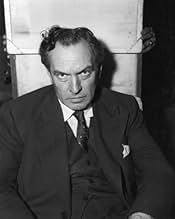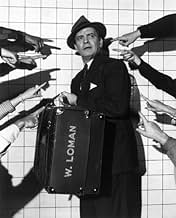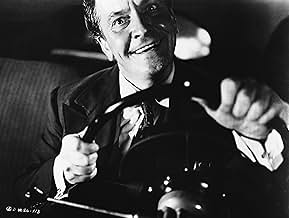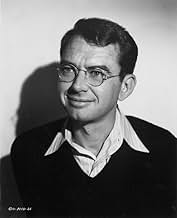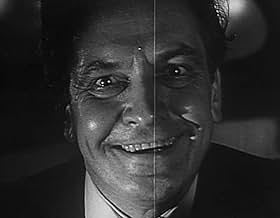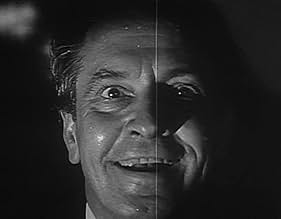IMDb RATING
7.2/10
1.3K
YOUR RATING
An over-the-hill salesman faces a personal turning point when he loses his job and attempts to make peace with his family.An over-the-hill salesman faces a personal turning point when he loses his job and attempts to make peace with his family.An over-the-hill salesman faces a personal turning point when he loses his job and attempts to make peace with his family.
- Director
- Writers
- Stars
- Nominated for 5 Oscars
- 8 wins & 11 nominations total
Beverly Aadland
- Girl
- (uncredited)
Jeanne Bates
- Mother
- (uncredited)
Gail Bonney
- Mother
- (uncredited)
Roger Broaddus
- Boy
- (uncredited)
Paul Bryar
- Subway Guard
- (uncredited)
Patricia Edwards
- Letta
- (uncredited)
Elisabeth Fraser
- Miss Forsythe
- (uncredited)
Charles Morton
- Subway Passenger
- (uncredited)
- Director
- Writers
- All cast & crew
- Production, box office & more at IMDbPro
Featured reviews
The main question is, how does the Fredric March version stack up against the Lee J. Cobb version. The answer is very well; it's probably a dead heat. Lee J. Cobb's performance has long been legendary, but March's was a little more emotionally authentic and agonizing.
Some critics objected that his Willy made the man seem insane and that insanity would rule out tragedy as the genre of the play/film. But King Lear went mad in the course of the play, and Strindberg's The Father involves madness in the protagonist. There is no point denying the evidence of the play itself in order to satisfy a theoretical rule that, at the same time, is violated in other plays. And the main evidence is that Willy got so involved with his memories that some of them became hallucinatory, especially in the office scene after he was let go from his job. Yes, there were numerous flashbacks in the play, but other scenes from the past took place in his mind and at times he became disoriented, talking loudly to absent characters such as his brother.
I found the Dustin Hoffman version not on the same level as the Fredric March or Lee J. Cobb version. Hoffman pushed method acting too much and was too young to portray a man in his early sixties.
I saw the Fredric March version in 1951 or 1952. Because of Arthur Miller's defiance of HUAC, the American Legion picketed the film and it was rarely if ever screened after that, until it was reissued as a DVD quite recently.
Some critics objected that his Willy made the man seem insane and that insanity would rule out tragedy as the genre of the play/film. But King Lear went mad in the course of the play, and Strindberg's The Father involves madness in the protagonist. There is no point denying the evidence of the play itself in order to satisfy a theoretical rule that, at the same time, is violated in other plays. And the main evidence is that Willy got so involved with his memories that some of them became hallucinatory, especially in the office scene after he was let go from his job. Yes, there were numerous flashbacks in the play, but other scenes from the past took place in his mind and at times he became disoriented, talking loudly to absent characters such as his brother.
I found the Dustin Hoffman version not on the same level as the Fredric March or Lee J. Cobb version. Hoffman pushed method acting too much and was too young to portray a man in his early sixties.
I saw the Fredric March version in 1951 or 1952. Because of Arthur Miller's defiance of HUAC, the American Legion picketed the film and it was rarely if ever screened after that, until it was reissued as a DVD quite recently.
Arthur Miller justifiably received a lot of acclaim for his Broadway stage version of DEATH OF A SALESMAN and this film version starring FREDRIC MARCH as Willie Loman is a faithful transfer of that work.
March is outstanding in his portrayal of a bitterly confused man who can't fathom why his life went so wrong, and CAMERON MITCHELL and KEVIN McCARTHY do outstanding work as the sons who are disillusioned by their father's failure. But the most memorable performance, in my estimation, comes from MILDRED DUNNOCK, who would go on to play similarly bitter women in her future roles on screen. But here she is poignant in what has to be one of the best character roles she ever had.
Surprisingly, the film is little seen today, seldom revived and largely forgotten. BRIAN DENNEHY did have success in a recent Broadway version and DUSTIN Hoffman has performed the role on TV. But the Fredric March version deserves to be seen, however heavy-handed the material is.
It's an exhausting experience, a story of one man's failure in life's journey, but dramatically very effective and it still has a lot to say.
March is outstanding in his portrayal of a bitterly confused man who can't fathom why his life went so wrong, and CAMERON MITCHELL and KEVIN McCARTHY do outstanding work as the sons who are disillusioned by their father's failure. But the most memorable performance, in my estimation, comes from MILDRED DUNNOCK, who would go on to play similarly bitter women in her future roles on screen. But here she is poignant in what has to be one of the best character roles she ever had.
Surprisingly, the film is little seen today, seldom revived and largely forgotten. BRIAN DENNEHY did have success in a recent Broadway version and DUSTIN Hoffman has performed the role on TV. But the Fredric March version deserves to be seen, however heavy-handed the material is.
It's an exhausting experience, a story of one man's failure in life's journey, but dramatically very effective and it still has a lot to say.
This all but lost 1951 version of Arthur Miller's American masterpiece was nominated for several prestigious Academy Awards in 1952, including Best Picture. That it has never been officially released on video is a shame, for, quite simply, Fredric March's go around as Willy Loman is a absolute treasure. The supporting cast are uniformly excellent; the mood and tone are consistently melancholy; the sets are spare, even stagy; and, most important, the pace is as brisk as this play will allow. Please search out this one out on TV-- you will not be disappointed.
Like many people ,I had seen the Schlondorff version starring Hoffman first,and I did like it.
This one should not be overlooked though :Arthur Miller's play,with its ceaseless to and fro between present and past , imaginary world and reality was not easy to transfer to the screen,and Laslo Benedek's directing is quite estimable:the scenes in the present are dark and make the house look like a tomb (notably when Willy comes back home) whereas the past which seems so bright is filmed in plain day light (the scene when young Biff and Happy polish the car );the subway is a good place to locate the events when willy has been fired;ditto for the final scene ,with all these 'living' night lights.The one thing which is passed over in silence is the boys' attitude after the funeral:Happy is "staying right in this city and gonna beat this racket,(...) and gonna win for him" whereas Biff "knows who he is" and that he perhaps will not never be able to settle down and take orders from somebody .
The cast is sensational:Fredric March gives a tormented performance ,switching back and forth between the extremes:sometimes proud of his athlete three colleges will take,often humble and bent in the office,where his boss is more interested in his tape recorder than in his salesman's future ;Mildred Dunnock is the patient mom,who trusts her dear husband ,even when the future seems bleak and he loses his mind ;Cameron Mitchell is Happy ,his dad's optimistic side ,a lady killer who thinks everything will work out fine (too bad his part is reduced in the last scene).Kevin McCarthy (film debut) is my favorite and he thoroughly deserved his AA nomination (he lost to Karl Malden 's Mitch in " a street car named desire): I love the way he talks about Bernhard ("he is liked ,but he is not well liked" ) ;he can be hilarious -the brief moment when he apes his teacher's lisp- or deeply moving when he breaks crying in his dad's arms ("Pop! I'm dime in a dozen and so are you!")His performance is at least as mind-boggling as that of John Malkovich thirty years later.
This one should not be overlooked though :Arthur Miller's play,with its ceaseless to and fro between present and past , imaginary world and reality was not easy to transfer to the screen,and Laslo Benedek's directing is quite estimable:the scenes in the present are dark and make the house look like a tomb (notably when Willy comes back home) whereas the past which seems so bright is filmed in plain day light (the scene when young Biff and Happy polish the car );the subway is a good place to locate the events when willy has been fired;ditto for the final scene ,with all these 'living' night lights.The one thing which is passed over in silence is the boys' attitude after the funeral:Happy is "staying right in this city and gonna beat this racket,(...) and gonna win for him" whereas Biff "knows who he is" and that he perhaps will not never be able to settle down and take orders from somebody .
The cast is sensational:Fredric March gives a tormented performance ,switching back and forth between the extremes:sometimes proud of his athlete three colleges will take,often humble and bent in the office,where his boss is more interested in his tape recorder than in his salesman's future ;Mildred Dunnock is the patient mom,who trusts her dear husband ,even when the future seems bleak and he loses his mind ;Cameron Mitchell is Happy ,his dad's optimistic side ,a lady killer who thinks everything will work out fine (too bad his part is reduced in the last scene).Kevin McCarthy (film debut) is my favorite and he thoroughly deserved his AA nomination (he lost to Karl Malden 's Mitch in " a street car named desire): I love the way he talks about Bernhard ("he is liked ,but he is not well liked" ) ;he can be hilarious -the brief moment when he apes his teacher's lisp- or deeply moving when he breaks crying in his dad's arms ("Pop! I'm dime in a dozen and so are you!")His performance is at least as mind-boggling as that of John Malkovich thirty years later.
In his autobiography, "Timebends," playwright Arthur Miller says he was pleased with this version of "Salesman" and felt that Fredric March was effective as Willy. I would love to make that determination for myself. I have always been a big fan of March, and the rest of the cast all seem ideal choices for their roles. I don't believe it is in TCM's library. I think it deserves a DVD release, as does the 1966 (German?) version of "The Crucible."
I check on the DVD availability of this version of "Salesman" every now and then, as well as the 1949 version of "The Great Gatsby" with Alan Ladd, along with some other films that are (surprisingly) not on DVD, such as "Last Year At Marienbad" and "Sundays and Cybele." Good things come to those who wait.
Indeed, even if you have to wait seven years. The Fredric March version of "Salesman" made its way to YouTube in October, 2014. The print is not very good, but the movie is fine. March is wonderful, even if he does start out the movie at something of a fevered pitch rather than working up to it, as another reviewer says. The two sons, Biff and Happy, are such ne'er do wells and so dishonest that they are thoroughly unsympathetic. Kevin McCarthy and Cameron Mitchell play them to perfection. Mildred Dunnock's Linda may be the best performance in the movie. She mediates, observes, cajoles, admonishes, plays on sympathies, comforts and encourages. It's amazing how many dimensions there really are to this character, and Dunnock finds and plays them all beautifully. "Death of a Salesman" is so stagebound that it's hard to find ways to open it up for the screen, so why bother? The story and performers draw audiences in to "Salesman," and because the subject matter is so unremittingly bleak and despairing, the acting has to be of a very high caliber to sustain interest. This is a feat the 1951 movie version pulls off handsomely.
I check on the DVD availability of this version of "Salesman" every now and then, as well as the 1949 version of "The Great Gatsby" with Alan Ladd, along with some other films that are (surprisingly) not on DVD, such as "Last Year At Marienbad" and "Sundays and Cybele." Good things come to those who wait.
Indeed, even if you have to wait seven years. The Fredric March version of "Salesman" made its way to YouTube in October, 2014. The print is not very good, but the movie is fine. March is wonderful, even if he does start out the movie at something of a fevered pitch rather than working up to it, as another reviewer says. The two sons, Biff and Happy, are such ne'er do wells and so dishonest that they are thoroughly unsympathetic. Kevin McCarthy and Cameron Mitchell play them to perfection. Mildred Dunnock's Linda may be the best performance in the movie. She mediates, observes, cajoles, admonishes, plays on sympathies, comforts and encourages. It's amazing how many dimensions there really are to this character, and Dunnock finds and plays them all beautifully. "Death of a Salesman" is so stagebound that it's hard to find ways to open it up for the screen, so why bother? The story and performers draw audiences in to "Salesman," and because the subject matter is so unremittingly bleak and despairing, the acting has to be of a very high caliber to sustain interest. This is a feat the 1951 movie version pulls off handsomely.
Did you know
- TriviaAccording to Arthur Miller, in a 2000 essay entitled, "Are You Now Or Were You Ever?" Columbia asked Miller to sign an anti-Communist declaration to ward off the threat of picket lines by the American Legion at theaters showing "Death of a Salesman". He refused. Instead, Columbia made another movie, a short film entitled "Life of a Salesman" to be shown with it. The short consisted of business professors from City College praising sales as a profession, and denouncing the character of Willy Loman. Miller wrote: "Never in show-business history has a studio spent so much good money to prove that its feature film was pointless."
- ConnectionsFeatured in Prêt-à-jeter (2010)
- How long is Death of a Salesman?Powered by Alexa
Details
- Release date
- Country of origin
- Official site
- Language
- Also known as
- Death of a Salesman
- Production company
- See more company credits at IMDbPro
- Runtime1 hour 55 minutes
- Color
- Aspect ratio
- 1.37 : 1
Contribute to this page
Suggest an edit or add missing content

Top Gap
By what name was La mort d'un commis voyageur (1951) officially released in India in English?
Answer
